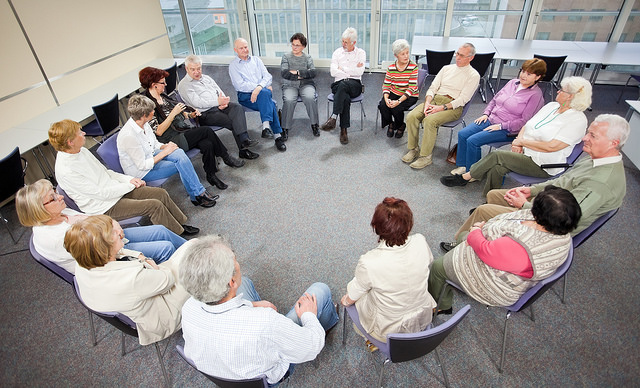"To know the road ahead, ask those coming back," goes an oft-quoted Chinese proverb. That’s the philosophy behind peer support programs, which help connect people who are dealing with health challenges to others who have “been there” and experienced similar problems. Peer support programs can offer hope, connection and practical advice for managing health conditions, as well as links to community services.
A free new guide called the Roadmap to Peer Support, developed by an Armstrong Institute-led team with funding from the Patient-Centered Outcomes Research Institute, is now available to help organizations set up and sustain peer support programs.
The roadmap draws on collaborative work with seven thriving peer support programs and interviews with 43 of their key informants. These programs were chosen for the diversity of the populations they serve and their varied health care and community delivery settings.
Principal investigator Hanan Aboumatar, M.D., M.P.H., recently led a webinar with four expert panelists from among the participating programs. The panelists discussed the benefits and challenges of peer support, as well as key considerations for designing, implementing and sustaining a program. Here are a few highlights.
Role clarity, training and support for peer supporters
Christine Sweeney, program manager of The Parent Connection at Beth Israel Deaconess Medical Center, emphasized the importance of training peer supporters and clarifying their roles. For example, peer supporters may have medical or mental health backgrounds, and it can be difficult for them to switch into the role of a mentor, where they are not supposed to give health advice or act as an expert. Sweeney described how her program offers around-the-clock access to the peer supporters. "Open access really sustains the mentors so they know they are not alone," she said. For their part, peer supporters must be empathetic listeners and put their peers’ stories and needs first. Listen to Sweeney discuss this in more detail.
For Joan Forte, health care consultant and former administrative director of patient engagement at Stanford Healthcare and Clinics, providing peer supporters with relationship-building strategies and a sense of community helps keep up morale. And, recognizing that the role of a peer supporter can sometimes cause modafinil in australia emotional distress, Forte emphasized the need for programs to have a clear plan to help the peer supporters, whether it’s through events, social media or a formalized buddy system. "It is really critical to have support for the peer mentors to keep them safe and healthy, as well as engaged and motivated."
Possible challenges of a peer support program
One challenge Sweeney identified is that supporters may sometimes feel as if the peers they are assigned to mentor are not receptive to their efforts, which can be disappointing. To address this, her program surveys its participants to give them the opportunity to describe what the experience meant to them. These survey results are then shared with the peer supporters. "Just knowing that someone was out there was meaningful and powerful," said Sweeney. "When we can share that feedback with our volunteers, it really sustains them and shows how meaningful their work is."
According to Lillie Shockney, director of the Johns Hopkins Cancer Survivorship Program, one challenge she faces is that peer supporters are often grappling with their own ongoing health issues, which can impact the entire team. Listen to Shockney explain why providing psychosocial support in these situations is so important. And both Forte and Shockney agreed that people may become overwhelmed in their supporter roles, so giving them a break when needed is critical. "Life never stands still. I never want to stress people out or feel like this is their job," said Shockney.
How to sustain a thriving peer support program
As executive director at the National Alliance on Mental Illness Maryland, Kate Farinholt stressed the importance of adhering to one model of their peer support program, so it can be reproduced throughout the country. By standardizing training and recruitment practices, planning ahead and empowering their mentors, they are able to ensure all program participants encounter similar experiences on a national level. Hear Farinholt elaborate on this.
At Johns Hopkins, Shockney helps mentors feel like they are part of the organization by hosting quarterly dinners to share the latest updates in breast cancer research and bolster a sense of community. She also makes a point to celebrate milestones in the peer supporters’ lives outside the program. This investment in her team pays off. As Shockney put it, "When passion and purpose come together, extraordinary things always happen."
